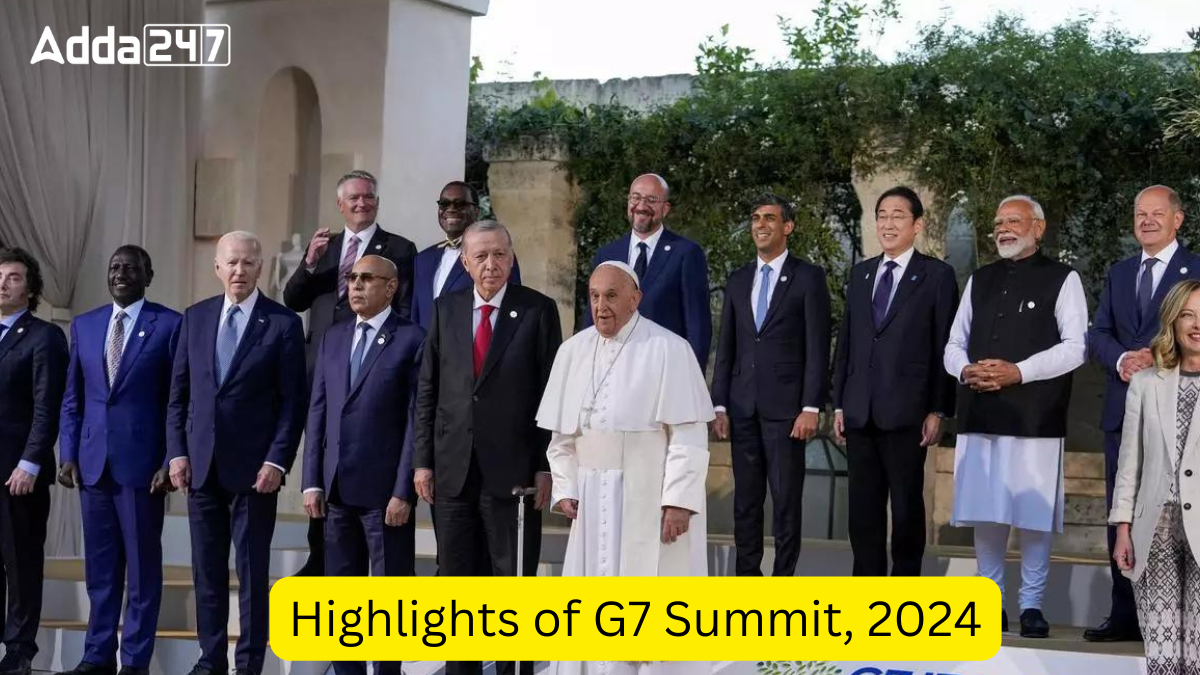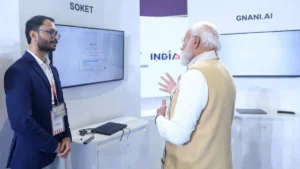Prime Minister Narendra Modi on June 14, held a series of bilateral meetings with world leaders. The countries including UK counterpart Rishi Sunak, French President Emmanuel Macron, Ukrainian President Volodymyr Zelensky, and others, on the sidelines of the G7 Summit, in southern Italy’s Apulia. Later, the Prime Minister also met Pope Francis of the Vatican.
About G7 Summit
The G7 Summit is an international forum held annually for the leaders of the G7 member states of France, the United States, the United Kingdom, Germany, Japan, Italy, and Canada (in order of rotating presidency), and the European Union (EU).
Features of the G7 Summit
At the G7 Summit, the leaders of the G7, which shares fundamental values such as freedom, democracy and human rights, exchange candid views on important challenges the international community is facing at that time, such as the global economy, regional affairs and various global issues, and issue a document as an outcome of such discussions. With the leadership of the leaders of the G7, which shares fundamental values, the G7 has effectively responded to important challenges that the international community faces.
The Beginning of the G7 Summit
In the 1970s, developed countries that faced various challenges such as the Nixon shock (1971) and the first oil crisis (1973) began recognizing the need to create a forum to comprehensively discuss policy coordination of macro economy, currency, trade, and energy, among others, at a leader’s level. Against this backdrop, proposed by then-French President Giscard d’Estaing, the first Summit was held in November 1975 at the Chateau de Rambouillet (located in the outskirts of Paris), with participation from six countries-France, the United States, the United Kingdom, Germany, Japan, and Italy. Since then, Summits have been held annually with revolving Presidency. Russia’s membership was suspended in March 2014 in response to its annexation of Crimea.
About 2024 G7 Summit
The 50th G7 includes Canada, France, Germany, Italy, Japan, the United Kingdom, and the United States. Italy, hosting the summit, has invited African leaders-Algerian President Abdelmadjid Tebboune, Kenyan President William Ruto, and Tunisian President Kais Saied-to discuss Meloni’s plans for development and migration in Africa. Other guests include Ukrainian President Zelenskyy, Brazilian President Luiz Inácio Lula da Silva, Indian Prime Minister Narendra Modi, and Turkish President Recep Tayyip Erdogan. Many G7 countries are also experiencing political changes. With Biden, UK Prime Minister Rishi Sunak, and French President Emmanuel Macron facing elections soon, there is pressure on the G7 to achieve as much as possible while the current leadership remains.
Theme of this year summit
The theme of this year’s summit, which will be attended by President Recep Tayyip Erdoğan of the Republic of Turkiye, as a special guest, has been set as “rules-based international system.”
Italy’s agenda for the 2024 summit?
The 2024, 50th G7 summit will be held from 13 to 15 June in Apulia, in Italy. It will be the first major international forum hosted by the Italian prime minister, Giorgia Meloni, since she took office in October 2022. As well as the wars in Ukraine and Gaza, Italy says it wants the summit to focus on Africa and migration, economic security, and international co-operation on artificial intelligence (AI).
Focus of this year summit
- Supporting Ukraine’s Fight for Freedom: G7 leaders announced a plan to provide Ukraine with $50 billion in new financing by bringing forward the interest earned on immobilized Russian sovereign assets held in the European Union and other jurisdictions. The Biden Administration this week issued a sweeping set of new sanctions and export control measures, guided by G7 commitments to intensify the pressure on Russia for its war against Ukraine. In Puglia, President Biden and President Zelensky signed the U.S.-Ukraine Bilateral Security Agreement as a demonstration of enduring U.S. support for Ukraine, including through binding commitments to deepen our security and defense cooperation and to consult in the event of a future armed attack.
- Advancing International Peace, Security, and Prosperity: The G7’s work is grounded in a shared commitment to respect the UN Charter, promote international peace and security, and uphold the free and open rules-based international order.
- Promoting Economic Resilience and Economic Security: President Biden rallied the G7 to take further steps to protect our workers, industries, and the investments.
- Partnering with Developing Countries to Invest in their Future: The G7 is taking ambitious steps to scale up support to developing countries and accelerate progress toward the Sustainable Development Goals.
- Accelerating the Clean Energy Transition to Address Climate Change: The G7 is accelerating its work to address the challenges of climate change, pollution, and biodiversity loss.
- Promoting Health and Food Security: The G7 continues to lead global efforts to address the food security crisis and support strong, resilient and responsive health systems around the world.
- Investing in Childcare to Support Women’s Economic Participation: The G7 is tackling the unequal gender distribution of care work, which contributes to gender inequality.
- Enhancing Our Partnership on Migration: Drawn from the principles of the Los Angeles Declaration on Migration and Protection that President Biden launched at the Summit of the Americas in 2022, the G7 affirmed a collective commitment to addressing migration in ways that reflect both the challenges and opportunities it presents.
- Deepening Cooperation on Artificial Intelligence: In line with the Biden Administration’s vision laid out in the October 2023 Executive Order on the Safe, Secure, and Trustworthy Development and Use of Artificial Intelligence, the G7 is building partnerships around the world to ensure the benefits of artificial intelligence and other technologies are widely shared while mitigating risks.
- Increasing Coordination to Promote AI Safety: G7 leaders committed to step up efforts to enhance interoperability between our respective approaches to AI governance and risk management.




 PM Modi Unveils India AI Impact Expo 202...
PM Modi Unveils India AI Impact Expo 202...
 India To Hosts First-Ever Global South A...
India To Hosts First-Ever Global South A...
 Bharat Bodhan AI Conclave 2026 Kicks Off...
Bharat Bodhan AI Conclave 2026 Kicks Off...








